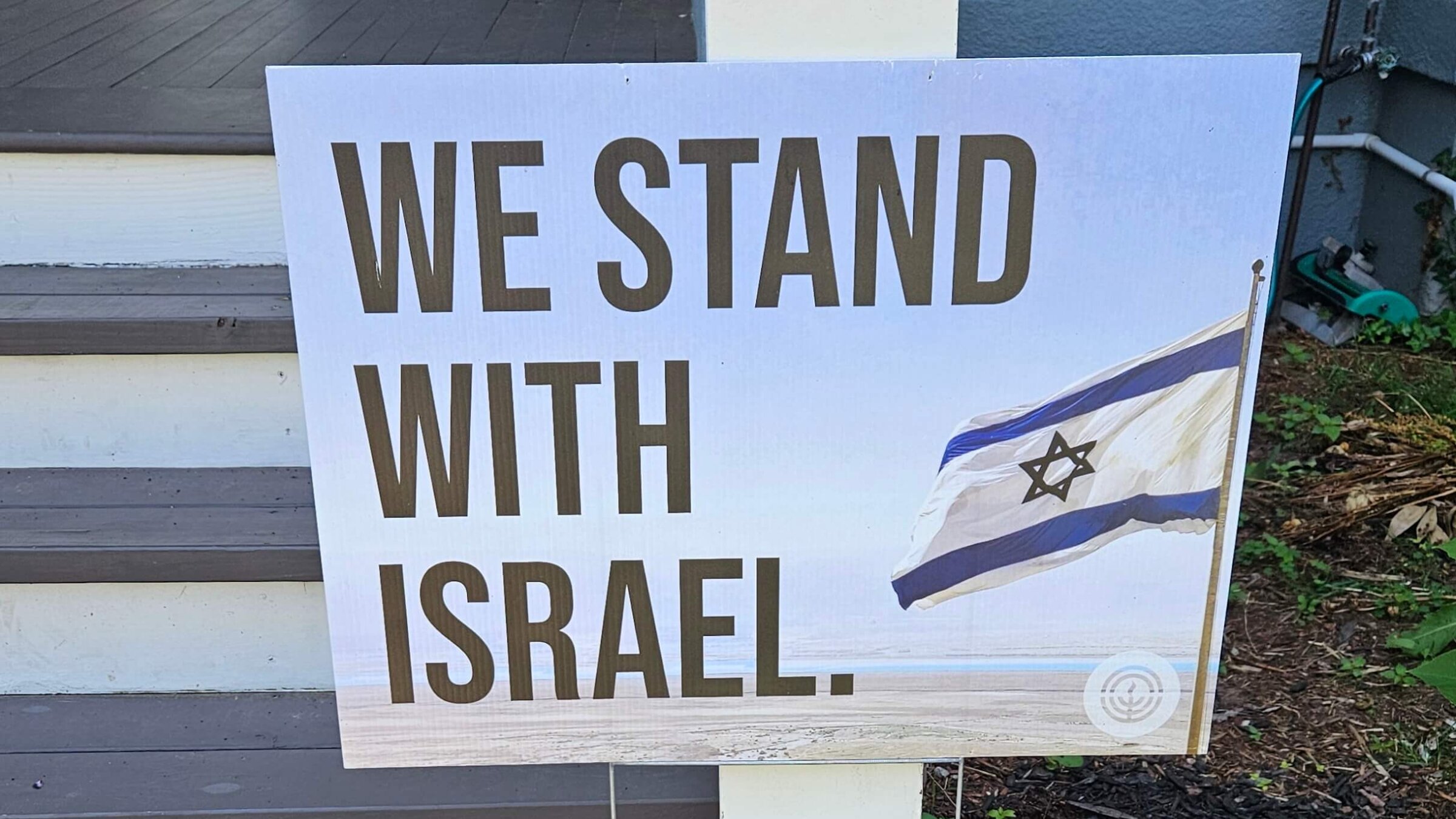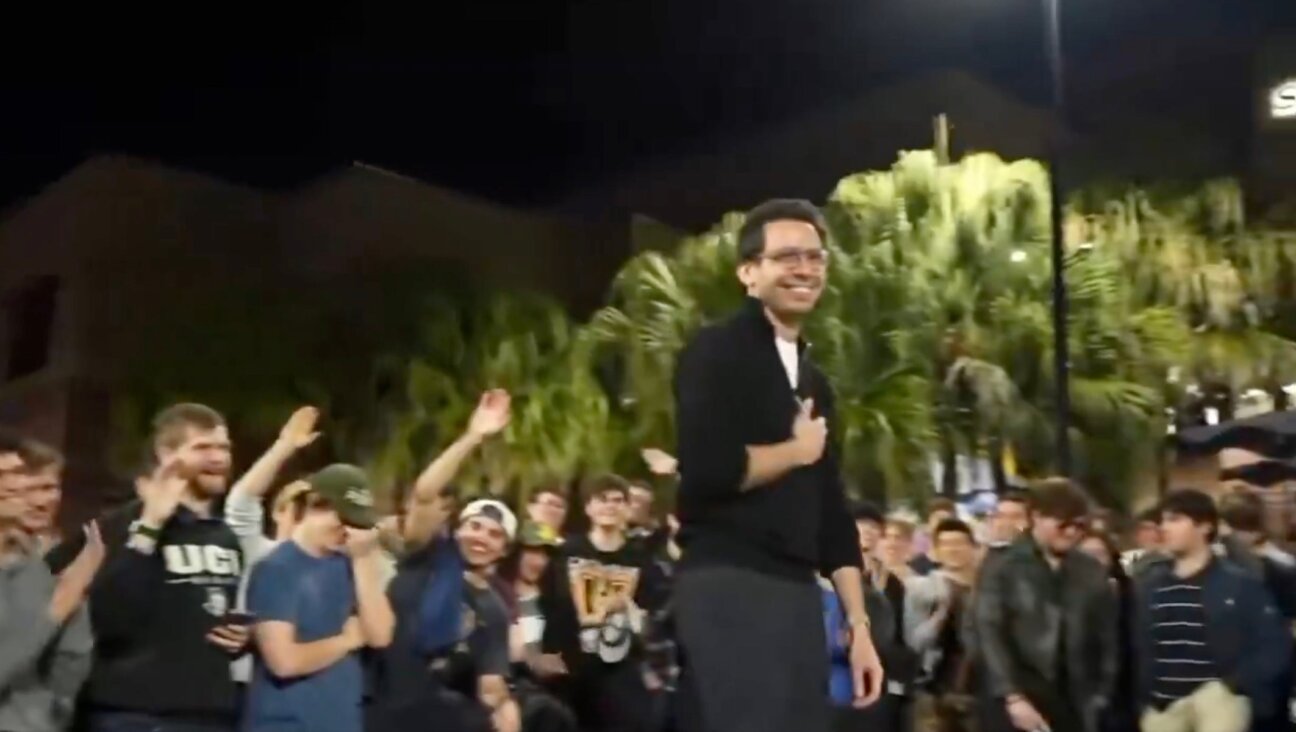Why I (finally) took down my ‘We Stand With Israel’ sign
Not because I don’t support the Jewish state. Because not everything can be summed up in a slogan

I haven’t stopped supporting Israel — but I’m increasing concerned about the consequences of tribalism. Courtesy of Josh Katz
MONTCLAIR, New Jersey — My teenage daughter saw it first, as she walked up the path after school. Someone had stuck a sheet of lined notebook paper to the “We Stand With Israel” lawn sign at the foot of our steps. Using a ball-point pen, they’d scrawled a single word in all-caps: GENOCIDE.
My daughter, a 17-year-old senior, was troubled. My wife, who runs her own human resources consulting company, was scared. My son, an 8th grader, felt what I did: fury.
We checked our security camera and quickly found images of the culprit. We called the police. And we talked — again — about the sign we’d had in front of our home for eight months, and the swirl of emotions and conflicts it had caused.
We’d hardly thought about it when we put the first sign up right after Hamas terrorists from Gaza invaded Southern Israel on Oct. 7. A friend had some signs printed — “We Stand With Israel” — in blue and white, with a couple Stars of David. She sold them for $10 each, proceeds going to help survivors and aid agencies. The attack had been so blatantly horrendous that a sign supporting Israel felt like a natural, unifying and safe message.
Reality quickly set in, as support for the attack and blame on Israel appeared almost instantly on college campuses and city streets. As the weeks went on, we realized that these were not isolated incidents. On the political left, a chorus of voices rose against Israel — and against people who support Israel; against Jews.
In our liberal town of Montclair, New Jersey, the comments section in a community Facebook group were so toxic that some Jewish neighbors started an invitation-only group where the only people included were those who “stand with Israel.”
And that’s where the panic over the signs was born.
The day before Halloween, someone posted about a lawn sign getting defaced a few towns away. People convinced each other that, under cover of trick-or-treating, no-good-niks would be swooping in to deface our Israel signs — or worse. A local rabbi advised that it was OK to break Jewish law and custom “if you are truly worried for your safety.”
People yanked their signs, and most never put them back out.
Not us. It’s not that I thought having an Israel sign on my lawn in a leafy New York suburb was an act of bravery. Bravery is action in the face of fear, and fear is a response to some evidence of danger.
I thought about the fear experienced by the kibbutzniks hiding in their shelters and under their beds on Oct. 7. The fear experienced by the Nova festivalgoers hiding in the beverage tent and in ditches. The fear of the Israeli soldiers fighting that day to keep their country from being overrun, and every day since to rid Gaza of Hamas.
My first thought when I saw all the chatter about taking down lawn signs was: Please don’t let me get stuck in a foxhole with these people. Even the person who sold us the first sign had taken it in on Halloween.
After a while, I replaced that sign with one from our local Jewish federation that was bigger and included an Israeli flag.
The new sign was still up in March, when anti-Israel protesters chanted “We don’t want no Zionists here” one Friday afternoon in the town center, a few minutes walk from my house. The rally was advertised as a call for a ceasefire, but devolved to calls for Israeli annihilation and then for the political cleansing of Montclair residents like us who dared to “Stand with Israel.”
The words hit you differently when you hear them in person. The look in the eyes of the protesters — especially those whose faces are covered by kaffiyehs — feels different when they’re only a few yards away.
I had helped to organize a counterprotest. At one point, the pro-Palestinian crowd crossed the street and purposely bumped one of our organizers while chanting aggressively in our faces. The police intervened. It was intense.
My wife was shaken by the experience. This was real fear, and when we got home, she wanted to take down our sign.
But to me, taking down the sign after people chanted “we don’t want no Zionists” was the Montclair version of letting the terrorists win.
It turned out that my daughter was also increasingly uncomfortable proclaiming our support for Israel on our front lawn. She travels in performing arts circles where support for Palestinians is popular, and was tense about the conversations the sign might spark when she brought friends home.
My daughter handles her Judaism in public like she does everything else: deliberately and openly, but with very little fanfare. I’m a bit different, walking around with Israeli flag patches on my jackets and bags, or a hoodie that says, “You Can’t Kidnap Jews And Expect To Get Away With It.”
But even I had started to develop some ambivalence about the sign.
In the initial aftermath of Oct. 7, many of us experienced a tribalism that felt comforting, justified and necessary. As anti-Israel sentiment has been uncovered at campuses and other institutions, that tribalism continues to be a comfort and to seem necessary. I have also never wavered in my belief that Israel’s war in Gaza is both moral and being conducted morally.
But tribalism breeds groupthink and is inherently illiberal, two things that make me uncomfortable.
I watched as support for Israel and the fight against antisemitism became the lens through which some of my fellow Jews viewed everything — and I was pretty sure the lens was cloudy.
For example, I’m not convinced that the IHRA definition of antisemitism is critical to the “survival of our people,” as someone I know recently asserted. I also don’t think President Joe Biden has it out for the Jews. Former President Donald Trump might be more willing to send the National Guard to break up campus protests, but in a country that for 247 consecutive years has been the safest place in the world to be Jewish, I’m not going to vote for a convicted felon who is an existential threat to the republic, simply because his authoritarian tendencies happen to benefit us today.
If history is any teacher, authoritarianism, from the left or the right, rarely ends up being good for the Jews.
I worried that our “We Stand With Israel” sign seemed to communicate “We (Blindly) Stand With Israel.” At least, that’s what it had started to say to me.
And then some dumb teenager tacked a note saying “GENOCIDE” on it.
My daughter thought she recognized the girl captured by our security cameras. The police were able to confirm her identity pretty quickly. Like my daughter, the girl on camera was a high school senior, and our house was on her route home from school. The officer handling the case told me that regardless of whether her actions constituted a felony or misdemeanor, because she was not yet 18, no charges were likely to be brought.
We decided not to post about the incident on social media. But I told the officer I’d like the girl to apologize.
Within an hour of hearing what happened, the girl’s parents brought her to our front porch to do exactly that. We talked about private property rights, about how serious it is to accuse someone of committing or supporting genocide. We told her how glad we were that our vandal turned out to be her instead of some more militant adult.
She apologized, quite sincerely, for making us feel threatened and alarmed. She insisted she had no antipathy toward Jewish people. I told her it was fine to have the courage of her convictions, but that leaving an anonymous note wasn’t courageous at all. Then we all shook hands.
A week later, I took in the sign.
















